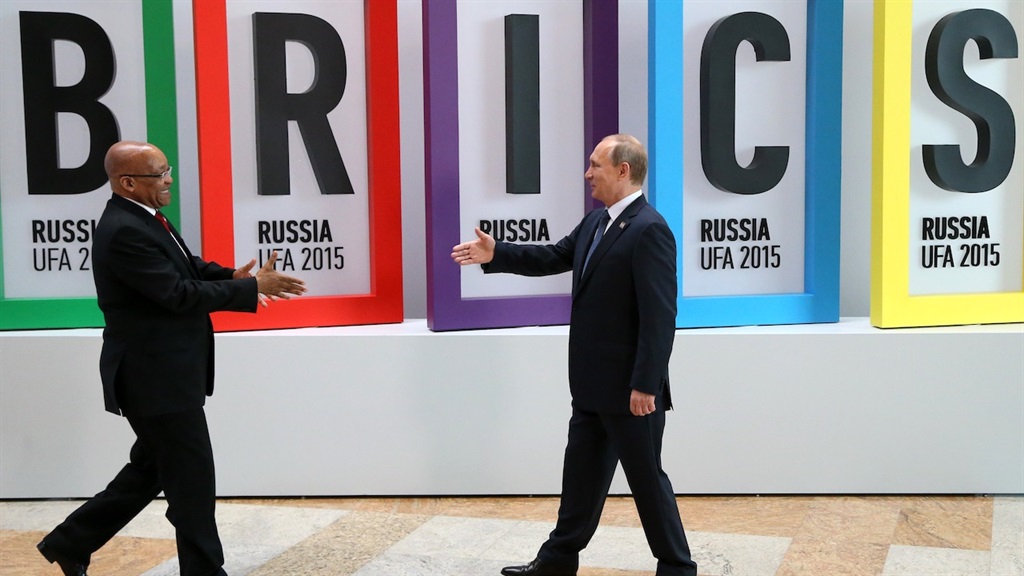
Before the 2023 summit in South Africa, BRICS came close to toppling. Patrick Bond examines at least five areas where things did go wrong.
Before the 22-24 August summit in Johannesburg raised expectations for a new counterbalancing force in global politics, at least five factors reduced the Brazil-Russia-India-China-South Africa (BRICS) bloc to a zone of acrimonious mediocrity.
However, conditions have changed over the past year, and talk of a 'BRICS+' with new members and a 'de-dollarisation' agenda are raising the profile of this network to an unprecedented – and unrealistic – level.
Emerging from a period in which internal contradictions appeared to cause 'spalling' – in which the BRICS wall came close to toppling – it is useful to recall what was going wrong:
First, three years of the Covid-19 pandemic prevented BRICS leaders from having in-person summits or from convening the hundreds of specialist bureaucrat, business, academic and civil society gatherings that had featured in the bloc's ecosystem.
Second, from 2019-22, Jair Bolsonaro’s Brazilian government retarded the bloc’s progress and wrecked its cohesion due to his right-wing extremism and pro-Western alignment – e.g. on the critical matter of the South gaining patent waivers for Covid-19 vaccines and treatments. The waivers represented a major World Trade Organisation (WTO) reform proposal, and though they were vetoed mainly by Europeans on behalf of their drug industries in 2021-22, Angela Merkel and Boris Johnson must have appreciated Bolsonaro’s joining the handful of leaders rejecting repeated appeals by Indian Prime Minister Narendra Modi and South African President Cyril Ramaphosa, who spoke for more than 100 countries when demanding vital pharmaceutical products be considered "global public goods."
READ | OPINION: TRIPS non-waiver outcome highlights need for domestic intellectual property law reform
Third, Sino-Indian turf disputes regularly flared high in the Himalayas, reflecting a lack of borderline resolution dating to the early 1960s, leading in 2020 to the death of scores of troops in hand-to-hand combat. There is no end in sight to military skirmishes over the mountainside land and – due to excessive Chinese dam-building – over southern-flowing river sources.
The other extended site of conflict stretches west to Pakistan from Kashmir, where local resistance continues against Delhi's strict control and Islamophobia, as well as Beijing's desire to control Kashmiris in China.
Increased levels of Sinophobia
Further west, Beijing is funding $65 billion worth of corridor infrastructure from Pakistan's Gwadar port to western China, which it considers increasingly vital due to mercantile vulnerabilities in the Strait of Malacca, and in order to gain faster Belt and Road Initiative access to oil imports from the Persian Gulf. But this level of economic commitment to India's primary enemy state – including an area of contested sovereignty within Pakistan – infuriates Delhi authorities, who in turn have repeatedly shut down Chinese corporations' own investments and exhibited extreme levels of nationalist Sinophobia.
READ | IN-DEPTH: Why Russia's attempts to woo African leaders may not have gone according to plan
Fourth, Vladimir Putin's February 2022 invasion of Ukraine was not just catastrophic in local terms, but also upended global food and energy markets, creating enormous political push-and-pull pressures across the world.
Putin nearly caused a constitutional crisis in South Africa due to the prospect of the local courts compelling President Cyril Ramaphosa to enforce an International Criminal Court arrest warrant (for kidnapping tens of thousands of Ukrainian children), were he to arrive in person at the 2023 Johannesburg summit. Ramaphosa beseeched the Russian leader to attend the summit virtually as a side deal component of the South African's leadership of an ineffectual Kyiv-Moscow peace mission by several African leaders in June 2023.
Ramaphosa also publicly requested the Russian leader to restore sea access to Ukrainian exports responsible for nearly 10% of the world's grain supply, but Putin ignored that appeal, instead offering free supplies of his own grain to several impoverished countries whose leaders attended the St. Petersburg Russia-Africa summit in late July.
READ | ANALYSIS | Russian Wagner debacle raises red flags for African states and how security is managed
Fifth, there were important ruptures within several BRICS leaderships, what with the narrow electoral victory of Brazilian President Lula da Silva over Bolsonaro and the failed attempt by the latter's supporters to carry out a January 2023 insurrection, the June 2023 mutiny by Putin's former close ally Yevgeny Prigozhin and his Wagner Group of mercenaries; the mysterious disappearance of Chinese Foreign Minister Qin Gang in July amid swirling rumours about an affair with a British spy or simply ineffectual performance; and in South Africa, Ramaphosa's near-resignation in December 2022 due to a damning inquiry into personal corruption.
Unstable members
While Chinese leader Xi Jinping, Modi and Putin appear to have consolidated their personal power, the two weaker BRICS are unstable: Lula faces a hostile Bolsonarite-dominated Congress and relies upon self-crippling alliances with neoliberals atop his own government; while Ramaphosa's own financial corruption case and the unreliability of his deputy president (not to mention his predecessor’s brief jailing on 12 August – on charges related to a French arms dealer’s bribes – followed by an immediate pardon), as well as widespread load shedding, will probably result in his party losing majority status and stitching together a coalition government after the mid-2024 election.
Yet in spite of the chaos created in the process, the BRICS' three primary-product exporting economies – Brazil, Russia and South Africa – performed better than was otherwise expected from mid-2020 after the main lock-down shock, as mineral and fossil fuel prices first crashed but then soared to record levels, and again from March 2022 after Putin's invasion, when commodity prices rose even higher for at least a few more months.
Even Russia could therefore bounce back surprisingly quickly from intense Western financial sanctions and the seizure of more than $600 billion in overseas assets belonging to the state and oligarchs – sanctions which sent strong messages to formerly pro-Western tyrants, especially in the Middle East, that their Western assets were not safe either.
That, in turn, is a factor that, in the BRICS expansion plans, has generated enormous tensions given that many of the candidates to join are, to put it mildly, tyrannical.
- Patrick Bond is Distinguished Professor and Director of the Centre for Social Change at the University of Johannesburg.
Disclaimer: News24 encourages freedom of speech and the expression of diverse views. The views of columnists published on News24 are therefore their own and do not necessarily represent the views of News24.




 Publications
Publications
 Partners
Partners
























